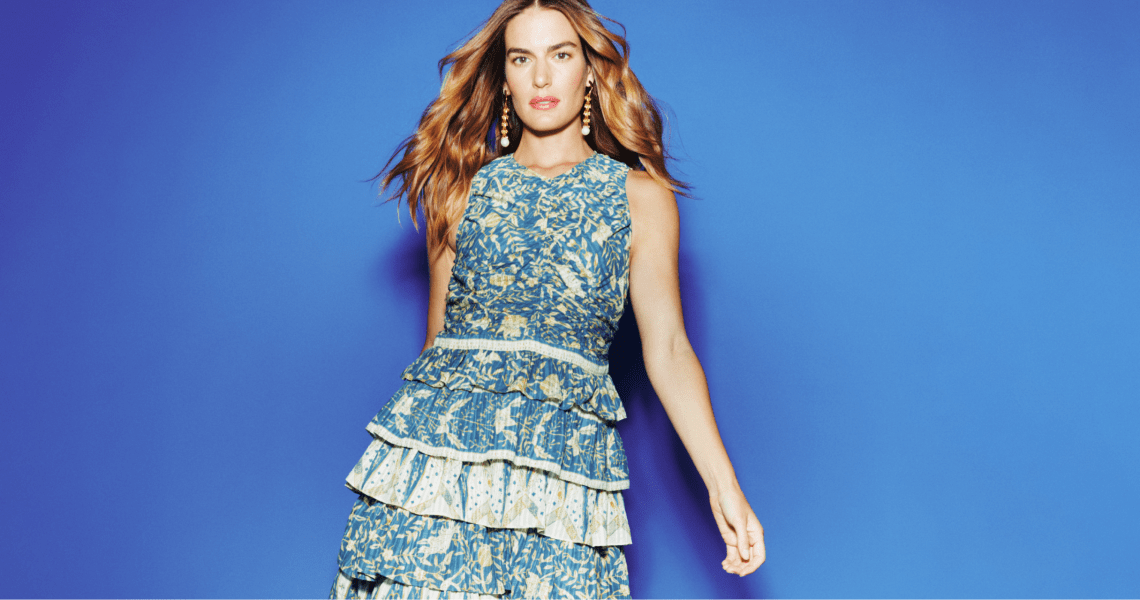On Thursday, Rent the Runway announced a partnership with Amazon Fashion centered on selling both used rentals and new, unworn pieces from its Design Collective line on the marketplace. The Design Collective, first announced by Rent the Runway in 2018, has so far functioned as a house label. It’s made in partnership with designers and incorporates RTR data on what its renters like. Rent the Runway has exclusively offered new Design Collective styles for rental, before later offering the worn styles for sale.
Now, new Design Collective styles are being sold through both Rent the Runway and Amazon. Effectively, the partnership makes Amazon the first retailer, other than Rent the Runway, to carry a made-for-rental collection from multiple designers. Amazon’s Pre-Loved inventory from Rent the Runway includes hundreds of styles across 35 designers, while the Design Collective inventory includes over 1,000 styles.
The Design Collective collection launching on Amazon includes new styles created in collaboration with Adam Lippes, Derek Lam, Esteban Cortazar, Marina Moscone, Ronny Kobo, Jonathan Saunders and Thakoon Panichgul, among other designers.
While RTR was not able to confirm whether the company has plans to produce seasonal Design Collective collections or to extend the range to other retailers, it confirmed that the Amazon partnership represents demand for RTR products beyond its own community. In June 2021, Rent the Runway expanded the sale of its used rentals to shoppers beyond its members. In July 2020, it launched a partnership with ThredUp to sell its secondhand styles to the ThredUp community. It launched a resale-specific partnerships with Saks Off 5th in July 2022.
“This is a sensible move by Rent the Runway, as it gives them both access to the fast-growing new resale customer and a showcase on Amazon, which will help drive interest and sales,” said Neil Saunders, retail analyst and managing director at data analytics company GlobalData. “Given its extensive inventory of luxury products, Rent the Runway should be able to put together a very compelling resale offer.”
Amazon launched luxury resale through a What Goes Around Comes Around partnership in October last year.
Rental is still a tough sell. And as the market becomes more saturated, rental companies will have to look further afield to bring in customers, making Amazon a natural fit. Amazon is estimated to have sold more than $65 billion worth of apparel and footwear in 2022. 2022 was a tough year for RTR, as it laid of 24% of its corporate employees in a restructuring aimed at future profitability in a difficult market. Although the company remains unprofitable, its net loss shrank from $87.8 million in the third quarter of 2021 to $36.1 million in the same period last year.
Ad position: web_incontent_pos1
RTR’s expanding partnerships echo the need for rental services to broaden their reach. In the UK, rental platform Hurr has a pop-up in Selfridges that saw triple-digit growth last year, while My Wardrobe HQ has had a pop-up in Harrods since 2021. Hurr, which reported $7.3 million in annual revenue in November 2022, launched a resale section in January 2022. My Wardrobe has also taken RTR’s lead, launching the U.K.’s first rental subscription offering, leveraging a tiered model, on January 5. Currently, neither provider produces a house label.
“The creation of new pieces is a point of differentiation, which Rent the Runway is [no doubt] hoping will pull in more customers,” said Saunders. “All of this diversification is important, as Rent the Runway needs to find new revenue streams to bolster growth and profitability. The traditional rental model alone does not seem capable of delivering that.”
Fashion companies are increasingly paying attention to the rental opportunity. For its part, URBN launched rental subscription service Nuuly in July 2019, with a thrift platform launch in October 2021. In its earnings for Q3, reported November 21, URBN shared that Nuuly contributed $35.3 million to URBN’s net sales, backed by a sharp rise in subscribers, up by 37% from the prior quarter. Meanwhile, since 2021, Ralph Lauren, Vince and LK Bennett have launched rental through service provider CaaStle. On its website CaaStle promotes its services to brands, stating that “instead of purchasing garments infrequently, [subscribing rental] consumers spend money with your brand every month.” Ganni started testing rental in 2019 and launched a peer-to-peer rental platform in April. Many brands see rental’s value as offering a consistent revenue stream while limiting excessive production.




